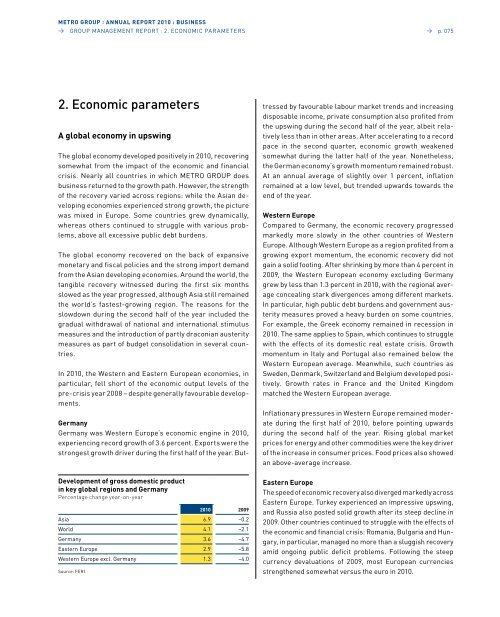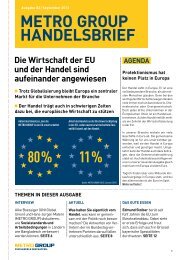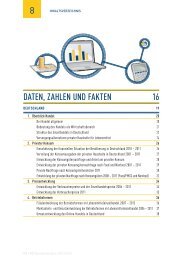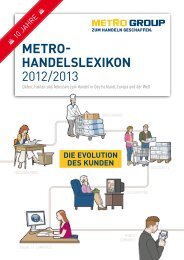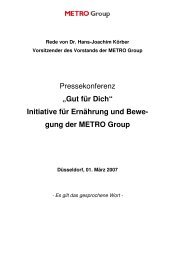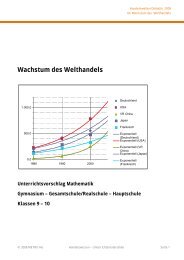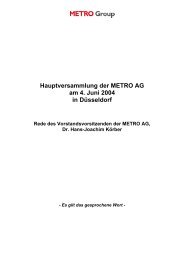pdf (2.5 MB) - METRO Group
pdf (2.5 MB) - METRO Group
pdf (2.5 MB) - METRO Group
Create successful ePaper yourself
Turn your PDF publications into a flip-book with our unique Google optimized e-Paper software.
<strong>METRO</strong> GROUP : ANNUAL REPORT 2010 : BUSINESS<br />
→ GROUP MANAGEMENT REPORT : 2. ECONOMIC PARAMETERS<br />
A global economy in upswing<br />
The global economy developed positively in 2010, recovering<br />
somewhat from the impact of the economic and financial<br />
crisis. Nearly all countries in which <strong>METRO</strong> GROUP does<br />
business returned to the growth path. however, the strength<br />
of the recovery varied across regions: while the Asian developing<br />
economies experienced strong growth, the picture<br />
was mixed in Europe. Some countries grew dynamically,<br />
whereas others continued to struggle with various problems,<br />
above all excessive public debt burdens.<br />
The global economy recovered on the back of expansive<br />
monetary and fiscal policies and the strong import demand<br />
from the Asian developing economies. Around the world, the<br />
tangible recovery witnessed during the first six months<br />
slowed as the year progressed, although Asia still remained<br />
the world’s fastest-growing region. The reasons for the<br />
slowdown during the second half of the year included the<br />
gradual withdrawal of national and international stimulus<br />
measures and the introduction of partly draconian austerity<br />
measures as part of budget consolidation in several countries.<br />
In 2010, the western and Eastern European economies, in<br />
particular, fell short of the economic output levels of the<br />
pre-crisis year 2008 – despite generally favourable developments.<br />
Germany<br />
Germany was western Europe’s economic engine in 2010,<br />
experiencing record growth of 3.6 percent. Exports were the<br />
strongest growth driver during the first half of the year. But-<br />
→ p. 075<br />
2. Economic parameters tressed by favourable labour market trends and increasing<br />
disposable income, private consumption also profited from<br />
the upswing during the second half of the year, albeit rela-<br />
Development of gross domestic product<br />
in key global regions and Germany<br />
Percentage change year-on-year<br />
2010 2009<br />
Asia 6.9 –0.2<br />
world 4.1 –2.1<br />
Germany 3.6 –4.7<br />
Eastern Europe 2.9 –5.8<br />
western Europe excl. Germany 1.3 –4.0<br />
Source: FERI<br />
tively less than in other areas. After accelerating to a record<br />
pace in the second quarter, economic growth weakened<br />
somewhat during the latter half of the year. Nonetheless,<br />
the German economy’s growth momentum remained robust.<br />
At an annual average of slightly over 1 percent, inflation<br />
remained at a low level, but trended upwards towards the<br />
end of the year.<br />
Western Europe<br />
Compared to Germany, the economic recovery progressed<br />
markedly more slowly in the other countries of western<br />
Europe. Although western Europe as a region profited from a<br />
growing export momentum, the economic recovery did not<br />
gain a solid footing. After shrinking by more than 4 percent in<br />
2009, the western European economy excluding Germany<br />
grew by less than 1.3 percent in 2010, with the regional average<br />
concealing stark divergences among different markets.<br />
In particular, high public debt burdens and government austerity<br />
measures proved a heavy burden on some countries.<br />
For example, the Greek economy remained in recession in<br />
2010. The same applies to Spain, which continues to struggle<br />
with the effects of its domestic real estate crisis. Growth<br />
momentum in Italy and Portugal also remained below the<br />
western European average. Meanwhile, such countries as<br />
Sweden, denmark, Switzerland and Belgium developed positively.<br />
Growth rates in France and the United Kingdom<br />
matched the western European average.<br />
Inflationary pressures in western Europe remained moderate<br />
during the first half of 2010, before pointing upwards<br />
during the second half of the year. Rising global market<br />
prices for energy and other commodities were the key driver<br />
of the increase in consumer prices. Food prices also showed<br />
an above-average increase.<br />
Eastern Europe<br />
The speed of economic recovery also diverged markedly across<br />
Eastern Europe. Turkey experienced an impressive upswing,<br />
and Russia also posted solid growth after its steep decline in<br />
2009. Other countries continued to struggle with the effects of<br />
the economic and financial crisis: Romania, Bulgaria and hungary,<br />
in particular, managed no more than a sluggish recovery<br />
amid ongoing public deficit problems. Following the steep<br />
currency devaluations of 2009, most European currencies<br />
strengthened somewhat versus the euro in 2010.


